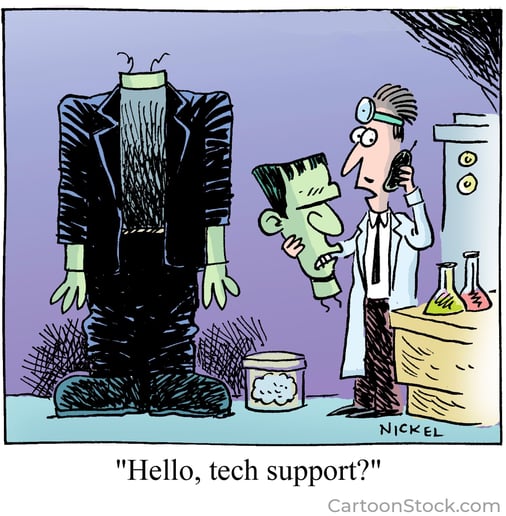
DP Solutions Named Best Cybersecurity Company and Best IT Outsourcing Firm in Maryland

DP Solutions was awarded the Top Winner for both the Best IT Outsourcing Firm and the Best Cyber-Security Company in Maryland by The Daily Record in its 2022 Reader Rankings survey.
This marks the 6th year in a row for the IT Outsourcing Firm recognition and the 1st year the company was named as the top winner in the Cybersecurity Category
See the Full Press Release Here.
Think about some of your private accounts right now. Chances are that you have an e-mail, social media accounts, bank account and more that are all password-protected. Do you share passwords across different accounts, and are your passwords strong enough to keep cybercriminals away from your private information? If not, it might be time to evaluate.
Passwords offer the first line of defense when someone tries to access your sensitive information. Without passwords, anyone could gain access to your social media account, which could provide them with personal information that could harm you. Even worse, bank accounts would be easily accessible to cybercriminals who are hoping to rob you of your funds.
While many personal accounts are password-protected, your business accounts also need to be properly secured. But this doesn’t just exclusively apply to you – it needs to be understood on a company-wide level. Every employee needs to use passwords to keep sensitive business information secure. Think about the damage a cybercriminal could do to your business if they gained access. They would permanently damage your company’s reputation while also putting your employees’ and customers’ private information at risk.
However, it’s not enough to simply put a password in place. The passwords you choose need to be complex. But what makes a password complex? A complex password will utilize a mix of uppercase and lowercase letters, numbers, punctuation and special characters. Additionally, your password should not be related to any personal information, nor should you use dictionary words. Your password should be incredibly difficult for someone to guess, even if they know you well, but you also need to ensure that your password is something you can remember.
In addition to that, even with a complex password, it’s likely still not enough protection. Each of your accounts and devices should have a unique password that hasn’t been used anywhere else. If you use the same password across all accounts and devices, you’re opening yourself up to a pretty extreme cyber-attack if one of your accounts is compromised. All a cybercriminal needs to do is hack your Facebook page, and they will have the password for your bank accounts and e-mail.
You might think that it’d be impossible to remember so many different complex passwords, but software is available that can help. The best way to keep track of your passwords is to use a password manager. With a password manager, you only have to remember one master password, and the software keeps track of the rest. It will even help you create complex passwords for your different accounts to ensure that your information is as protected as possible.
If you oversee a team of employees, then it’s vital that they understand why creating strong passwords is so important. Your team should have trainings on cyber security practices, including information on creating passwords. If just one employee fails to create a complex and unique password, it could open you up to a cyber-attack.
Creating strong passwords does not have to be difficult. If you’re struggling to remember or create strong passwords, use a password manager. Strong passwords will help keep your sensitive information protected.

Leaders often fail to hold their team accountable. During research for our book, Powerscore, we found that only 8% of leaders are good at holding people accountable. One of the main reasons that leaders fail in this area is that when it’s done wrong, it makes things more difficult for everyone.
Here’s an example: I was giving a keynote speech at a Fortune conference a few years back and asked the audience, “How many of you have goals for your teams that are written down?” Only 10% raised their hands. Failure to write down goals opens up the door to confusion. It becomes nearly impossible to hold someone accountable for delivering a result when you have failed to articulate what you’re looking for.
In order to hold your team accountable, you need to be specific with goals and use numbers that others provide to measure performance. When I was still a young CEO with ghSMART, I struggled to hold a consultant accountable. She was brilliant and had great technical skills but failed to call clients proactively and didn’t follow up with them. Many clients did not ask for her to come back as their trusted advisor.
I called her into my office and told her that she needed to work on her client relationships. She disagreed and stated that her clients loved her work. I said, “Well, one client told me that although he values your work, he feels you treat him like ‘processed cheese’ and that you rush to finish projects with him and then you move on to your next client project.” She said that her work spoke for itself, and the meeting abruptly ended.
This was a huge failure on my part as I failed to set specific, mutually agreed upon goals and used vague wording. I talked about this with a mentor, and he said, “Make sure you have clear goals, in writing, so your consultants know what ‘great’ looks like. Then have somebody other than you collect data on their performance. Then you can sit down as a coach to review their results vs. their goals.”
It was great advice that I immediately put into practice. When you properly hold people accountable, high performers will know they are performing, and they will keep doing what they are doing. And lower performers will know they are not performing well, long before anybody has to sit them down to have a conversation.

Dr. Geoff Smart is the chairman and founder of ghSMART, a leadership consulting firm that exists to help leaders amplify their positive impact on the world. Dr. Smart and his firm have published multiple New York Times best-sellers. He stays active in his community and has advised many government officials.
.png)
It’s scary how fast the cybersecurity landscape can change…not to mention how expensive and impactful cyber incidents can be!
You want to set your organization up for security success, and to do that several components come into play: Your Technology, Your People, and Your Insurance.
DP Solutions is bringing together a panel of experts from the managed IT, cybersecurity, insurance, and human resources fields to discuss best practices for protecting your business from cyber threats. Don't miss this unique opportunity to hear about cybersecurity as it relates to all aspects of your business.
Sign Up Here:

Is it possible to completely secure a system from attack?
We often hear questions that go something like this: “If I sign off on X computer, will I not get hacked?”
This is where we need to face a sobering reality. Security tools, assessments, planning, and investment are all extremely important, but even best efforts from the finest cybersecurity professionals will NOT make things completely secure.
There is no bulletproof system or uncrackable security. Security is about discipline and consistency.
Every act you take to implement a security product, or do testing, or plan an upgrade can help improve your overall security and lower your risks. However, if history has told us anything it’s that there’s always an unknown vulnerability, something designed with a flaw, or some other crack in the armor that can be taken advantage of.
The point of having a security discipline is to maintain a low level of risk and put your organization in a position to respond to threats. It does not guarantee perfection, but it will mean that your security outcomes will be dramatically better than your peers that take a passive, undisciplined approach.